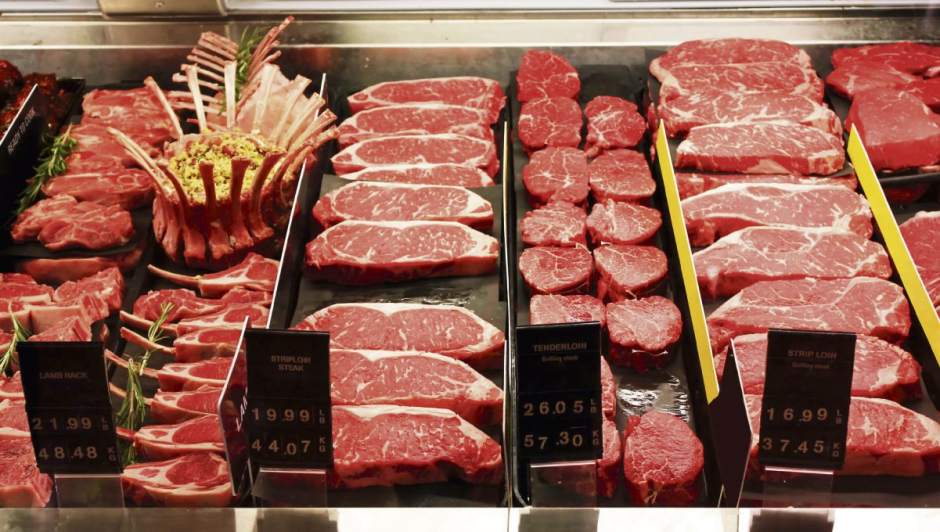https://archive.triblive.com/lifestyles/food-drink/consumption-of-red-meat-carries-risks-worth-weighing/
Consumption of red meat carries risks worth weighing

Fotolia
Red meat is nutrient-rich but should be eaten in moderation as part of a plant-filled diet, and cooked in ways that minimize health risks.
Many people view red meat as a guilty pleasure, and expert groups, including the 2015 Dietary Guidelines Advisory Committee, advise us to cut back.
Some research suggests eating a lot of red meat may increase risk of premature death, heart disease, obesity, diabetes and certain cancers, especially colorectal cancer. At the same time, red meat, such as beef, pork and lamb, is nutrient-rich, offering protein, iron, zinc and vitamins B6 and B12.
Measuring risks of red meat
Each daily serving of processed meat, such as bacon, hot dogs or salami, is associated with a 15 percent higher risk of death from heart disease and an eight-percent increased risk of cancer-related death, according to a July 2015 Public Health Nutrition analysis of nine observational studies. Eating unprocessed red meat was associated with similar risks as processed meat among U.S. consumers, but not in Asians, who eat less red meat, nor in Europeans, who likely don't grill as often as Americans.
“These findings are not trivial, especially in America, where many people eat two or three servings of red meat every day,” says Frank Hu, an epidemiologist at Harvard School of Public Health in Boston and one of the study's authors.
However, as Hu and other experts have noted, such observational studies can't prove cause and effect.
“People who eat the most red and processed meats also tend to weigh more, smoke more cigarettes, exercise the least and eat fewer fruits and vegetables,” says Dr. David Klurfeld, national program leader for human nutrition at the USDA Agricultural Research Service in Beltsville, Md.
Observational studies of red meat intake also overlook potential benefits of grass-fed red meat since the majority of red meat eaten is from feedlot-raised, grain-fed animals.
Handle with care
Health risks of red meat depend on how it's processed and cooked.
“Cooking meat at high temperatures, such as pan frying, deep-fat frying, oven broiling and grilling, leads to formation of carcinogens called heterocyclic amines,” says Dr. Mariana Stern, a cancer epidemiologist and associate professor at the University of Southern California in Los Angeles. HCAs are less likely to form in lower-temperature cooking, such as baking, steaming and boiling.
“Grilling meat also generates carcinogens called polycyclic aromatic hydrocarbons, especially in charred portions. If meat is very fatty, more carcinogens will be formed than if meat is leaner.”
N-nitroso compounds are another type of meat carcinogen: “In some cases, such as processed meats, these carcinogenic compounds are present when you buy the meat,” Stern says. “There's also some evidence that N-nitroso compounds might form in the body from the action of bacteria in our mouth and gut if we eat a lot of unprocessed meats. However, if your diet is high in antioxidants, in particular vitamin C, such as from eating fruits and vegetables, that may help prevent N-nitroso compounds from forming in the body.”
Balance, variety, moderation
“People can eat meat as part of an overall healthy dietary pattern, but they need to move meat from the center of the plate to the side of the plate so meat isn't the primary source of calories,” Hu concludes.
You should minimize processed red meat, such as bacon and sausage, which seems to carry higher health risks.
Lastly, eat plenty of produce to help offset negative effects of red meat.
“Some research suggests that if moderate meat eaters (averaging about 3 ounces daily) consume enough fruits and vegetables, their death rates may be similar to vegetarians,” Klurfeld says.
Registered dietician Marsha McCulloch is a writer for Environmental Nutrition, the award-winning newsletter by nutrition experts. Details: environmentalnutrition.com
Copyright ©2025— Trib Total Media, LLC (TribLIVE.com)
